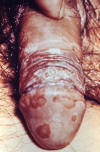 Reactive arthritis after a Borrelia burgdorferi (Lyme Disease) bacterial
infection. CDC
Reactive arthritis after a Borrelia burgdorferi (Lyme Disease) bacterial
infection. CDC| MICROBIOLOGY AND IMMUNOLOGY ON-LINE |
Reiter's syndrome, which is also known as reactive arthritis, is an autoimmune disease that results from infection, usually bacterial, in another part of the body. By the time that Reiter's is diagnosed, the initial infection has often been cured. The symptoms occur within a few weeks of the initial infection.
The arthritis of the large joints such as the knee is often accompanied by other inflammatory symptoms and include:
Other symptoms that accompany Reiter's Syndrome include:
Those who have prolonged Reiter's syndrome may progress to cardiac disease. About 10% of Reiter's patients fall into this category.
Reiter's syndrome is associated with HLA B27.
Among tyhe infectious agents known to cause Reiter's Syndrome are:
Sometimes the disease may be self-limiting but it can also be chronic with recurring bouts of arthritis.
The incidence of Reiter's Syndrome is hard to gauge as it is often not reported. After Chlamydia or enteric bacterial infection, the rate of Reiter's development is about 5 per 100,000.
 Reactive arthritis after a Borrelia burgdorferi (Lyme Disease) bacterial
infection. CDC
Reactive arthritis after a Borrelia burgdorferi (Lyme Disease) bacterial
infection. CDC
 Keratoderma blennorrhagica due to Reiter's syndrome. CDC/Dr. M. F. Rein
Keratoderma blennorrhagica due to Reiter's syndrome. CDC/Dr. M. F. Rein
 Circinate balanitis of the glans penis due to Reiter's
syndrome. CDC/Dr. Wiesner
Circinate balanitis of the glans penis due to Reiter's
syndrome. CDC/Dr. Wiesner